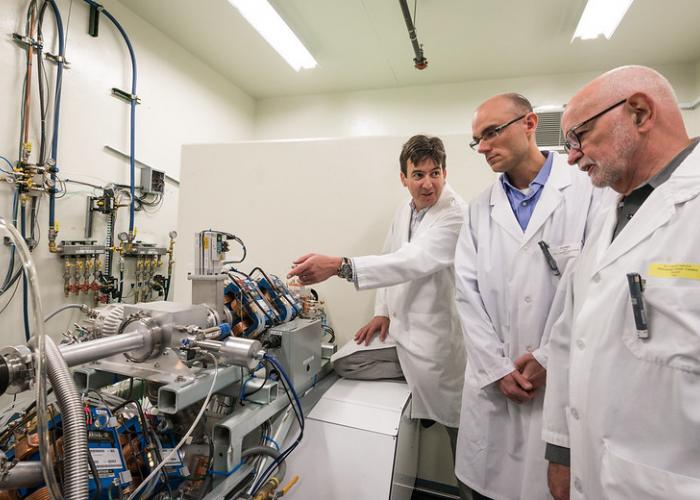
A made-in-Canada approach to producing the world’s most commonly used medical isotope has received Health Canada approval, ushering in a new era for patients in Canada and around the world who rely on these isotopes for critical diagnostic procedures.
Over a decade in the making, the Canadian consortium which includes BC Cancer, the University of British Columbia (UBC) and TRIUMF, is the first in the world to obtain regulatory approval for this approach, allowing for the production of technetium-99m (Tc-99m) for clinical use in Canada using small particle accelerators known as cyclotrons.
“This new technology will provide Canadians with consistent access to the resources they need for life-saving medical scans,” says Dr. François Bénard, senior executive director of research at BC Cancer and professor of radiology and associate dean of research at UBC’s faculty of medicine. “This has been a shared vision of many researchers across the country and we have to recognize the many collaborators who worked for years to make this announcement possible.”
With Tc-99m now able to be produced for clinical use at regional cyclotron facilities in Canada, starting in B.C., dependence on nuclear reactor technology will be reduced, helping secure a stable and environmentally friendly supply chain.
The achievement is based on a national Canadian effort between many partners, including BC Cancer, TRIUMF, UBC, Lawson Health Research Institute and the Centre for Probe Development and Commercialization. The clinical trial was conducted across multiple hospitals in Canada. Vancouver General Hospital and St. Paul’s Hospital were supplied with Tc-99m produced at BC Cancer while the clinical trial at St. Joseph's Health Care London and the Hamilton Health Sciences Centre were supplied from the cyclotron facility at Lawson Health Research Institute.
Approximately 4 per cent of Canadians require a diagnostic examination that uses Tc-99m each year. These diagnostic exams range from detecting bone and cardiac diseases to cancer.
The process was approved by Health Canada on November 26, 2020 and is expected to be deployed first in B.C. at the Institute for Advanced Medical Isotopes (IAMI), which is currently under construction and expected to be operational in 2022. The IAMI is supported in part by a significant donation to the BC Cancer Foundation.
This project was also made possible through grants from the Natural Sciences and Engineering Research Council (NSERC), the Canadian Institutes for Health Research (CIHR), and Natural Resources Canada.
*Image of François Bénard, Paul Schaffer and Tom Ruth at BC Cancer, next to a medical cyclotron is provided courtesy of NSERC via TRIUMF Lab for Flickr